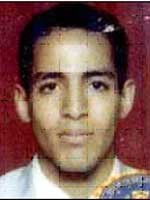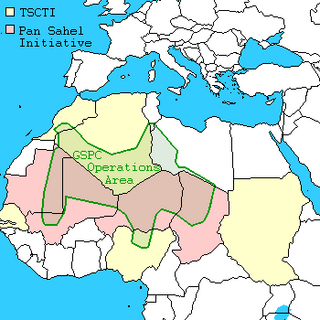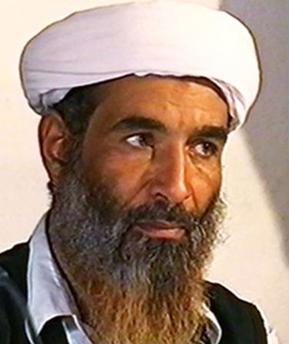Related Research Articles

Al-Qaeda is a pan-Islamist militant organization led by Sunni Jihadists who self-identify as a vanguard spearheading a global Islamist revolution to unite the Muslim world under a supra-national Islamic state known as the Caliphate. Its membership is mostly composed of Arabs, but also includes people from other ethnic groups. Al-Qaeda has mounted attacks on civilian, economic and military targets of the US and its allies; such as the 1998 US embassy bombings, the USS Cole bombing and the September 11 attacks. The organization is designated as a terrorist group by NATO, UN Security Council, the European Union, and various countries around the world.

Osama bin Mohammed bin Awad bin Laden was a Saudi Arabian-born Islamic dissident and militant leader who was the founder and first general emir of al-Qaeda from 1988 until his death in 2011. Ideologically a pan-Islamist, he participated in the Afghan Jihad against the Soviet Union and supported the activities of the Bosnian mujahideen during the Yugoslav Wars. Bin Laden is most widely known as the mastermind of the September 11 attacks in the United States.

The USS Cole bombing was a suicide attack by al-Qaeda against USS Cole, a guided missile destroyer of the United States Navy, on 12 October 2000, while she was being refueled in Yemen's Aden harbor.

Mohamed Salah al-Din al-Halim Zaidan commonly known by his nom de guerreSaif al-Adel is a former Egyptian Army officer and explosives expert who is widely understood to be the de facto leader of al-Qaeda. Al-Adel fought the Soviets as an Afghan Arab before becoming a founding member of the al-Qaeda organization. He is a member of Al-Qaeda's Majlis al-Shura and has headed the organization's military committee since the death of Muhammad Atef in 2001. He is currently known to live in Iran along with several other senior members of the group.

The bin Laden family, also spelled bin Ladin, is a wealthy family intimately connected with the innermost circles of the Saudi royal family. It is the namesake and controlling shareholder of Saudi Binladin Group, a multinational construction firm. Following the September 11 attacks, the family became the subject of media attention and scrutiny through the activities of Osama bin Laden, the former head of al-Qaeda.

Fazul Abdullah Mohammed was a Comorian-Kenyan member of al-Qaeda, and the leader of its presence in East Africa. Mohammed was born in Moroni, Comoros Islands and had Kenyan as well as Comorian citizenship. He spoke French, Swahili, Arabic, English, and Comorian.

The Special Activities Center (SAC) is a division of the United States Central Intelligence Agency responsible for covert and paramilitary operations. The unit was named Special Activities Division (SAD) prior to 2015. Within SAC there are two separate groups: SAC/SOG for tactical paramilitary operations and SAC/PAG for covert political action.
On September 11, 2001, 19 al-Qaeda terrorists took control of four commercial aircraft and used them as suicide weapons in a series of four coordinated acts of terrorism to strike the World Trade Center in New York City, The Pentagon in Arlington County, Virginia, and an additional target in Washington, D.C. Two aircraft hit the World Trade Center while the third hit the Pentagon. A fourth plane did not arrive at its target, but crashed into a field in Pennsylvania after a passenger revolt. The intended target is believed to have been the United States Capitol. As a result, 2,977 victims were killed, making it the deadliest foreign attack on U.S. soil, exceeding Japan's surprise attack on Pearl Harbor in Honolulu, Hawaii, on December 7, 1941, which killed 2,335 members of the United States Armed Forces and 68 civilians. The effort was carefully planned by al-Qaeda, which sent 19 terrorists to take over Boeing 757 and Boeing 767 aircraft, operated by American Airlines and United Airlines.

Saleh Ali Saleh Nabhan was the leader of al-Qaeda in Somalia. He was listed on the FBI's third major "wanted" list, the FBI Seeking Information – War on Terrorism list, for his association with multiple attacks in Kenya in 2002, as well as his possible involvement in the 1998 United States embassy bombings, in which over 250 people lost their lives.
Fahd Mohammed Ahmed al-Quso, also known as Abu Huthaifah, Abu Huthaifah Al-Yemeni, Abu Al-Bara', Abu Hathayfah Al-Adani, Abu Huthaifah Al-Adani, Fahd Mohammed Ahmed Al-Awlaqi, Huthaifah Al-Yemeni, or Abu Huthaifah Al-Abu Al-Bara, was alleged to be a terrorist by American and Yemeni officials, and on the FBI Most Wanted Terrorists list. He was wanted by the FBI, Interpol, and the United States Department of State, which had offered 5 million dollars to anyone with information about him. He was killed by a US drone strike in Yemen on 6 May 2012.

Operation Enduring Freedom – Horn of Africa (OEF-HOA) is a component of Operation Enduring Freedom (OEF). The Combined Joint Task Force – Horn of Africa (CJTF-HOA) is the primary military component assigned to accomplish the objectives of the mission. The naval components are the multinational Combined Task Force 150 (CTF-150) and Combined Task Force 151 (CTF-151) which operates under the direction of the United States Fifth Fleet. Both of these organizations have been historically part of United States Central Command. In February 2007, United States President George W. Bush announced the establishment of the United States Africa Command which took over all of the area of operations of CJTF-HOA in October 2008.
The following is a list of attacks which have been carried out by Al-Qaeda.

Al-Qaeda in the Arabian Peninsula, abbreviated as AQAP, also known as Ansar al-Sharia in Yemen, is a Sunni Islamist insurgent extremist group, which is part of the al-Qaeda network and primarily active in Yemen and Saudi Arabia. It is considered the most active of al-Qaeda's branches that emerged after the weakening of central leadership.

The 1998 United States embassy bombings were attacks that occurred on August 7, 1998. More than 220 people were killed in nearly simultaneous truck bomb explosions in two Capital East African cities, one at the United States Embassy in Dar es Salaam, Tanzania and the other at the United States Embassy in Nairobi, Kenya.
Osama bin Laden, a militant Islamist and co-founder of al-Qaeda, in conjunction with several other Islamic militant leaders, issued two fatawa – in 1996 and then again in 1998—that military personnel from the United States and allied countries until they withdraw support for Israel and withdraw military forces from Islamic countries. He was indicted in United States federal court for his alleged involvement in the 1998 U.S. embassy bombings in Dar es Salaam, Tanzania and Nairobi, Kenya, and was on the U.S. Federal Bureau of Investigation's Ten Most Wanted Fugitives list until his death.

Al-Qaeda has conducted operations and recruited members in Africa. It has included a number of bombing attacks in North Africa and supporting parties in civil wars in Eritrea and Somalia. From 1991 to 1996, Osama bin Laden and other al-Qaeda leaders were based in Sudan.

The Al-Qaeda insurgency in Yemen is an ongoing armed conflict between the Yemeni government, the United States and their allies, and al-Qaeda-affiliated cells in Yemen. It is a part of the Global War on Terror.

Mohammed Atef was the prominent military chief of al-Qaeda, and a deputy of Osama bin Laden, although Atef's role in the organization was not well known by intelligence agencies for years. He was killed in a US airstrike in November 2001.
On 15 May 2016, a suicide bombing in the southern Yemeni port city of Mukalla, the capital of the Hadhramaut province, killed at least 47 police and injured over 60. The bombing was preceded by an attack, where 15 Yemeni troops were killed in attacks on army positions outside Mukalla. ISIL said, one of its militants blew up a vehicle, packed with explosives, in an army base in the Khalf district at the city's eastern outskirts.
al-Qaeda has five distinct phases in its development: its beginnings in the late 1980s, a "wilderness" period in 1990–1996, its "heyday" in 1996–2001, a network period from 2001 to 2005, and a period of fragmentation from 2005 to 2009.
References
- ↑ Edward F. Mickolus and Susan L. Simmons, Terrorism, 1992-1995: A Chronology of Events and A Selectively Annotated Bibliography (Bibliographies and Indexes in Military Studies (Westport, Conn): Greenwood Press, 1997), 250.
- 1 2 Michael Scheuer, Through Our Enemies' Eyes: Osama bin Laden, Radical Islam, and the Future of America, Revised Edition (Dulles, VA: Potomac Books, 2006), p. 147.
- ↑ Peter Bergen, Holy War, Inc. (New York: Free Press, 2001), 176.
- 1 2 Lawrence Wright, The Looming Tower: Al-Qaeda and the Road to 9/11 (New York: Vintage Books, 2007), 198.
- ↑ Phil Hirschkorn, "Scant Evidence Shown to Link bin Laden to GI Deaths in Somalia". CNN. 20 April 2001.